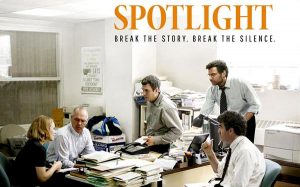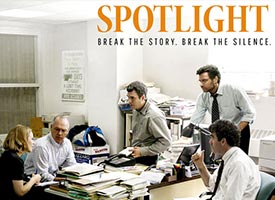(Rated 14A [Canada] and R [MPAA] for language, including sexual references; directed by Tom McCarthy; stars Michael Keaton, Mark Ruffalo, Rachel McAdams, Brian d’Arcy James, Liev Schreiber, Stanley Tucci, Billy Crudup, Len Cariou, Jamey Sheridan, Neal Huff and Richard Jenkins; run time: 128 min.)
A difficult story, skillfully told

By Ted Giese
In the words of a defense attorney working on behalf of sexually abused children, “If it takes a village to raise a child, it also takes a village to abuse one. That’s the truth of it.”
And that’s the idea examined by director Tom McCarthy in his new film “Spotlight.” It’s focused on the work of the Boston Globe’s “Spotlight” special investigatory team’s efforts to expose a decades-long cover-up of child abuse by Roman Catholic priests in Boston. The film does an admirable job of telling a complex, heartbreaking, true story of abuse and institutional corruption.
In 2001 the Boston Globe’s new editor, Martin Baron (Liev Schreiber), asked the paper’s four-person team of investigative journalists headed by Walter “Robby” Robinson (Michael Keaton) to consider investigating the case of a Roman Catholic priest, Father Geoghan, who had frequently molested children in six different parishes over a 30-year period. Robinson and the rest of his team, Sacha Pfeiffer (Rachel McAdams), Mike Rezendes (Mark Ruffalo) and Matt Carroll (Brian d’Arcy James) — who were all raised in the Catholic Church — weren’t initially convinced of the alleged story’s scope, but as they worked at it they dug up more information and facts. Quickly they came up against corruption and obstruction — both from the Archdiocese and the legal community. After being stonewalled repeatedly by Eric Macleish (Billy Crudup), a local lawyer involved with the Archdiocese, Robinson tells him, “We’ve got two stories here: the story about a bunch of degenerate priests, and the story about a bunch of lawyers turning child abuse into a cottage industry. Which story do you want us to write, ‘cause we’re writing one of them.”
In the end, the story was bigger than Robinson had thought. Under Editor Baron’s direction, the team holds off publishing their findings. He wants them to go after the system itself and the systemic corruption of not just one priest, or 87 priests, or any group of lawyers, or even Cardinal Bernard Law (Len Cariou).
As an outsider to Boston, looking at the situation with fresh eyes, Baron — who is Jewish, making him a double outsider — believed the story was about more than one person, that it was pervasive. He was right. In fact, the story the Spotlight team was working on was pervasive enough that the Boston Globe itself — and even Spotlight’s head investigator — would have to come to terms with the fact that their poor reporting in the past and their unwillingness to write certain stories contributed to the problem. In a gracious moment, as Robinson is fessing up to his part in the scandal by a sin of journalistic omission, Baron says, “Sometimes it’s easy to forget that we spend most of our time stumbling around in the dark. Suddenly a light gets turned on, and there’s a fair share of blame to go around.” This doesn’t absolve Robinson, but it does clarify why they needed to publish their findings.
Earlier in the film, Jim Sullivan (Jamey Sheridan) — who it turns out was deeply involved in the legal end of the scandal — blurts out, “I was doing my job!” to which Robinson replies, “Yeah, you and everyone else.” Robinson’s response turns out to be freighted with a sad irony. Fortunately, the film is the story of journalists finally understanding the magnitude of the story in front of them.
“Spotlight” is well acted and its ensemble cast of well-known Hollywood actors doesn’t detract. Viewers might expect a film centered on this topic to be sensationalized, but “Spotlight” doesn’t yield to this temptation. The script from McCarthy and Josh Singer is smart and gives viewers a film that is even-tempered and generally gracious toward all parties. Overall, if there’s a party that comes off more guilty than another, it’s the Archdiocese of Boston.
Thankfully, “Spotlight” doesn’t discount the fact that there is a spiritual dimension to the story. One of the adult survivors of childhood abuse, Phil Saviano (Neal Huff), explains to the reporters that what happened to him and to others wasn’t just physical abuse, “it’s spiritual abuse” — that when a priest abused a child in that way, the victims are in grave danger of losing their faith.
As a result of hearing the victim’s stories and dealing with the abuse cover-up, each of the four investigators experiences a struggle related to their vocation or to their faith. Rezendes, the reporter with the least favorable view toward the Roman Catholic Church, over a drink with his colleague Pfeiffer says, “I liked going to church as a kid.” He confesses to Pfeiffer that he even believed he would eventually go back to church later in his life. His crisis of faith comes as he grapples with the idea that his hope of returning to the Church is in jeopardy and may even be gone. In the course of Rezendes’ work, he spends a fair amount of time interviewing an ex-priest and psychotherapist, Richard Sipe (Richard Jenkins), who when pressed about his continued Christian faith admits to Rezendes, “The Church is an institution of men, and that’s passing. My faith is in the eternal. I try to separate the two.”
Like any viewers, Christians will find the film distressing and heartbreaking. The questions raised demand answers. And while the Roman Catholic Church is changing the way it deals with these situations as it becomes aware of them, “Spotlight” gets to the root cause when the ex-priest and psychotherapist Sipe on a conference call with the reporters says, “[mandatory clergy] celibacy is the problem.” Sipe adds that his research reveals that something like 50 percent of clergy within the Roman Catholic Church are in sexual relationships of some kind or another, and that he believed that about 6 percent of them are involved in the sexual abuse of minors. The mandatory celibacy requirement means that lies are regularly told to cover up any sexual relations.
Lutherans and Protestants overwhelmingly encourage their clergy to marry, citing St. Paul who says, “Because of the temptation to sexual immorality, each man should have his own wife,” and “It is better to marry than to be aflame with passion” (1 Corinthians 7:2, 9b). “Spotlight” may afford the opportunity for viewers to ponder anew the benefits of clergy marriage. While clergy marriage cannot stop every case of child sexual abuse, it does promote healthy and biblically faithful sexual relationships and provides a legitimate outlet for them to take place.
“Spotlight” is a tragically fascinating film about people doing the hard work of uncovering something others want to keep secret. The reporters sit at the back of court proceedings, they go to the archives, they conduct uncomfortable interviews with broken people, they check and double-check their information and get corroboration of evidence, they fight legal red tape, and they literally knock on doors hoping to talk with people who will talk when it seems the whole city of Boston wants to keep quiet.
The movie is emotional without being melodramatic and will hit many viewers hard. This is made even more poignant because “Spotlight” isn’t a flashy film — the clothing, sets and everything are mundane and common. Neither is the audience manipulated by the soundtrack or by clever camera work. The strong story and acting are enough to keep a viewer’s attention. Tom McCarthy has taken on a difficult subject in “Spotlight,” but in terms of getting the details and the tone right, he has succeeded in telling the journalistic part of this troubling story. He skillfully provides a movie of substance that is worth watching, even if it’s painful.
The Rev. Ted Giese (pastorted@sasktel.net) is associate pastor of Mount Olive Lutheran Church, Regina, Saskatchewan, Canada; a contributor to “Reformation Rush Hour” on KFUO AM Radio, the Canadian Lutheran and Reporter/Reporter Online; and movie reviewer for the “Issues, Etc.” radio program. Follow Pastor Giese on Twitter @RevTedGiese.
Posted Dec. 4, 2015
